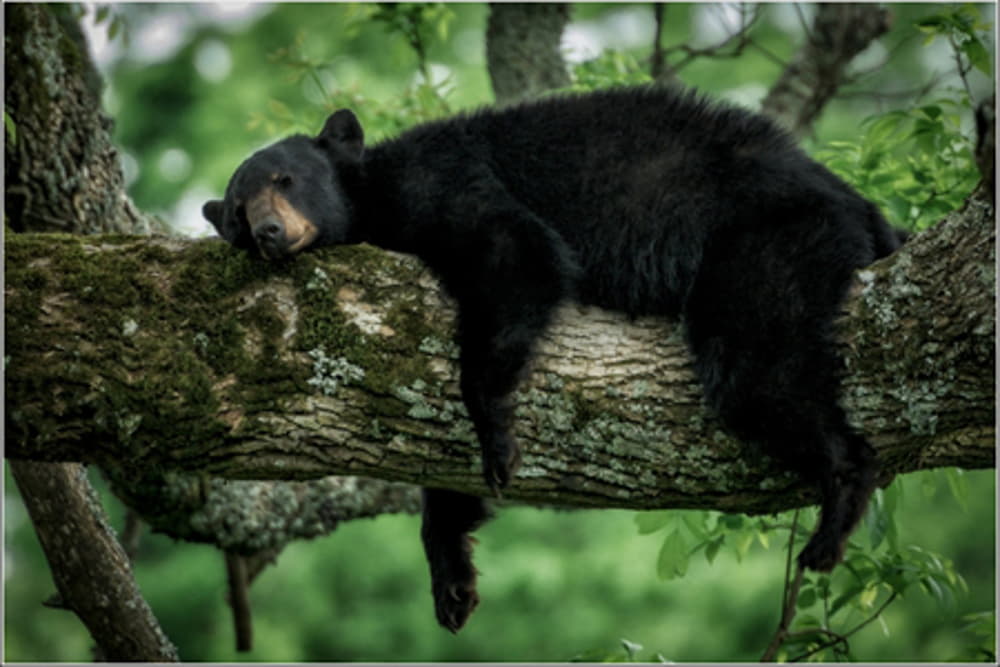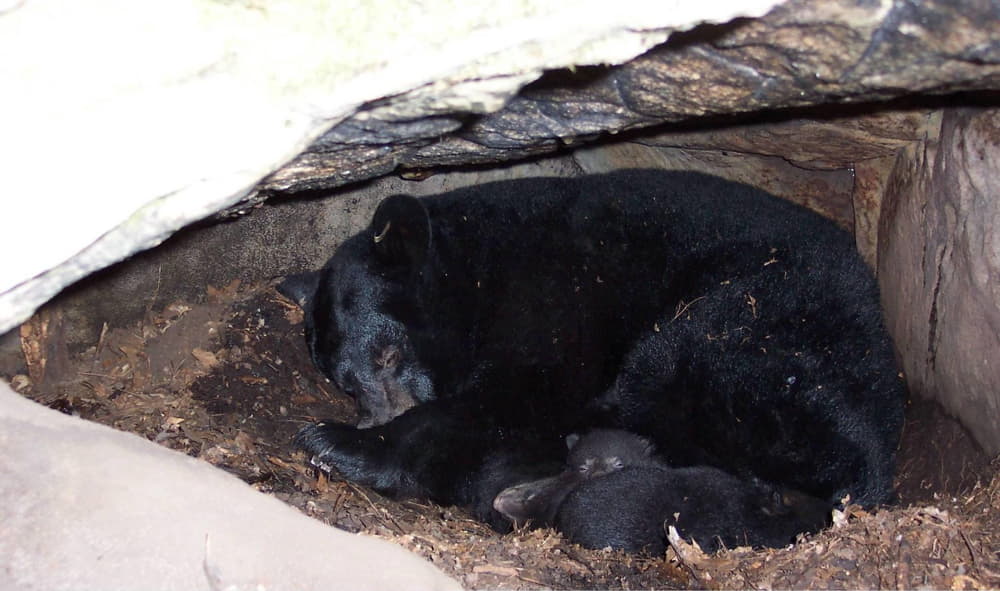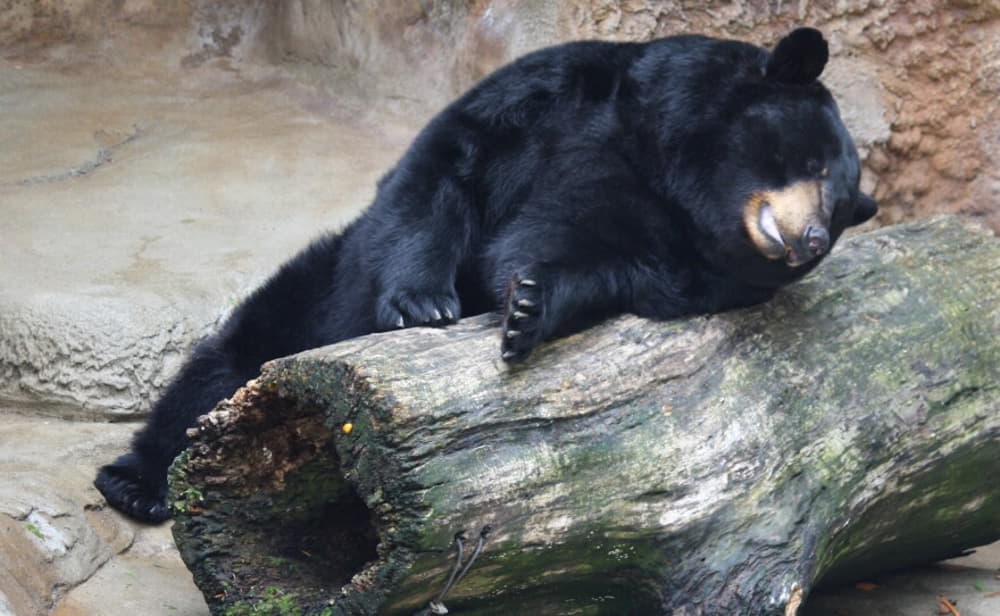Black bears, known for their adaptability and elusive nature, prefer to sleep in a variety of habitats based on the season and environmental factors. Their choice of sleeping location is not only a matter of rest but also one of survival. So, where do black bears sleep at night?
Black bears are more active than many people think. They spend a large amount of time foraging, exploring, climbing, swimming, and engaging in other activities. These enigmatic mammals display a remarkable adaptability in their choice of sleeping locations. Most people think that black bears sleep in dens, but that is not always the case. In fact, their sleeping arrangement changes depending on the circumstance.
During the warmer months, they might opt for a cool, shaded spot, ensuring concealment from potential threats. As the colder months approach, black bears prepare for their long winter’s sleep, by seeking out a secure den. Keep reading for details!
Table of Contents
When Do Black Bears Sleep?
Black bears adapt their sleeping schedule based on various factors such as food availability, weather conditions, and the presence of potential threats. Their sleep, or rest, is not confined to a single time of day.
In the warmer months, black bears often rest during the day in secluded spots and become more active during the cooler mornings and evenings when they are more likely to forage. During the colder months, some black bears hibernate for an extended period. The others enter into a lighter state of torpor and may emerge from their dens on milder days to search for food.
Bears sleep for an hour or two after nightfall and wake up around half an hour before sunrise. They also sleep once or twice a day. So, despite being early risers, they sleep for the majority of the night.
Where Do Black Bears Sleep At Night?
Black bears sleep in trees, on the ground or in dens at night. Bears sleep where they feel safe at night so that they are not disturbed. They prefer to sleep where it is cool, dark, and safe.
Trees
Black bears are excellent climbers and often sleep in trees to avoid predators such as wolves or coyotes. They usually sleep on sturdy branches or in the crotch of a tree trunk.
In fact, many hunters follow bears by checking for patches of suppressed grass that may indicate a bear has just rested there.

On The Ground
While black bears don’t typically sleep on the ground, they can do so if necessary. In rare cases where there are no trees or dens available, black bears may sleep on the ground hidden in dense vegetation or under a fallen log.
Dens
In colder months, black bears often hibernate in dens which protect them from the harsh weather conditions. They are more selective about where they will sleep during the winter. For the best chance of survival, they prefer to hibernate in regions that are secluded and inaccessible to other organisms. These are places like secluded caves, deserted trees, and other such settings.
There are black bears that dig their own dens, but the vast majority of them live in dens made out of hollow trees, logs, or caves. The height of den entrances can range anywhere from a few inches to many feet. Black bears often make beds of leaves and branches to sleep in their dens.
Read this post: What Time Of Day Are Bears Most Active?
Do Bears Sleep In The Summer?
Yes, bears do sleep in the summer. Do bears sleep in the summer is a question of many hunters because these days they rarely appear. Bears may take afternoon naps in addition to their nightly sleep during the summer.
The warm days of summer cause bears to sleep more than spring and fall. They easily overheat because they lack sweat glands and must expend more energy wandering around in hot weather. As a result, when they need to rest, they go for shaded spots to avoid overheating.
Additionally, bears usually have gained their summer weight and can be lazily enjoying the beautiful weather. They are prone to dozing a little more frequently in midsummer if they have attained a healthy weight.
Where do bears sleep in the summer? Bears will sleep on the ground, dense grasslands or anywhere safe and shady during the summer, spring, and fall. They are most active at dawn and dusk, and sleep during the darkest hours of the night and the hottest hours of the day.

Frequently Asked Questions
How long do black bears sleep in spring?
Black bears sleep for about 4-6 hours a day in spring. Depending on the weather, they can emerge from hibernation in early spring. Black bears can emerge for brief durations before going to slumber even before the snow melts in March and April.
Black bears become quite busy once spring arrives in earnest in late April. A bear does not sleep much by mid-Spring because they have lost so much weight over the winter. They get preoccupied with scavenging for food in order for him to restore his summer weight.
Are black bears active in Autumn?
Black bears are very active in Autumn because they need to gain weight before hibernating. They scavenge for food or attack unsuspecting ungulates to get additional food to fatten up. Black bears are also more dangerous to humans in September and October if they are low on food.
The appeal of food in bins or campsites, combined with their increased need for food, may lead bears to be more daring in approaching humans in late fall. So, it’s not uncommon for black bears to obtain only 4-5 hours of sleep per night in autumn as they prepare for the next winter.
Are black bears awake at night?
Black bears are not usually awake at night. They are known to be crepuscular or diurnal, which means they are more active during the daytime. However, they can be active at night, especially if they are attracted to a food source or if they feel safe enough to move around in the dark.

